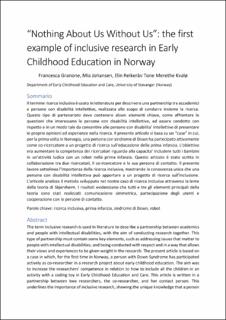”Nothing About Us Without Us”: the first example of inclusive research in Early Childhood Education in Norway
Peer reviewed, Journal article
Accepted version
Permanent lenke
https://hdl.handle.net/11250/3085246Utgivelsesdato
2023Metadata
Vis full innførselSamlinger
Originalversjon
Granone, F., Johansen, M., Reikerås, E.K.L., Kvalø, T.M.K. (2023) ”Nothing About Us Without Us”: the first example of inclusive research in Early Childhood Education in Norway. Consultori Familiari Oggi, 31 (1), 69-82.Sammendrag
The term inclusive research is used in literature to describe a partnership between academics and people with intellectual disabilities, with the aim of conducting research together. This type of partnership must contain some key elements, such as addressing issues that matter to people with intellectual disabilities, and being conducted with respect and in a way that allows their views and experiences to be given weight in the research. The present article is based on a case in which, for the first time in Norway, a person with Down Syndrome has participated actively as co-researcher in a research project about early childhood education. The aim was to increase the researchers’ competence in relation to how to include all the children in an activity with a coding toy in Early Childhood Education and Care. This article is written in a partnership between two researchers, the co-researcher, and her contact person. This underlines the importance of inclusive research, showing the unique knowledge that a person with an intellectual disability can bring to a research project about inclusion. The article analyses the method developed in our case of inclusive research through the lens of Skjervheim’s theory. Results highlight that all three main elements of the theory have been realized – symmetric communication, user participation and contact person cooperation.
